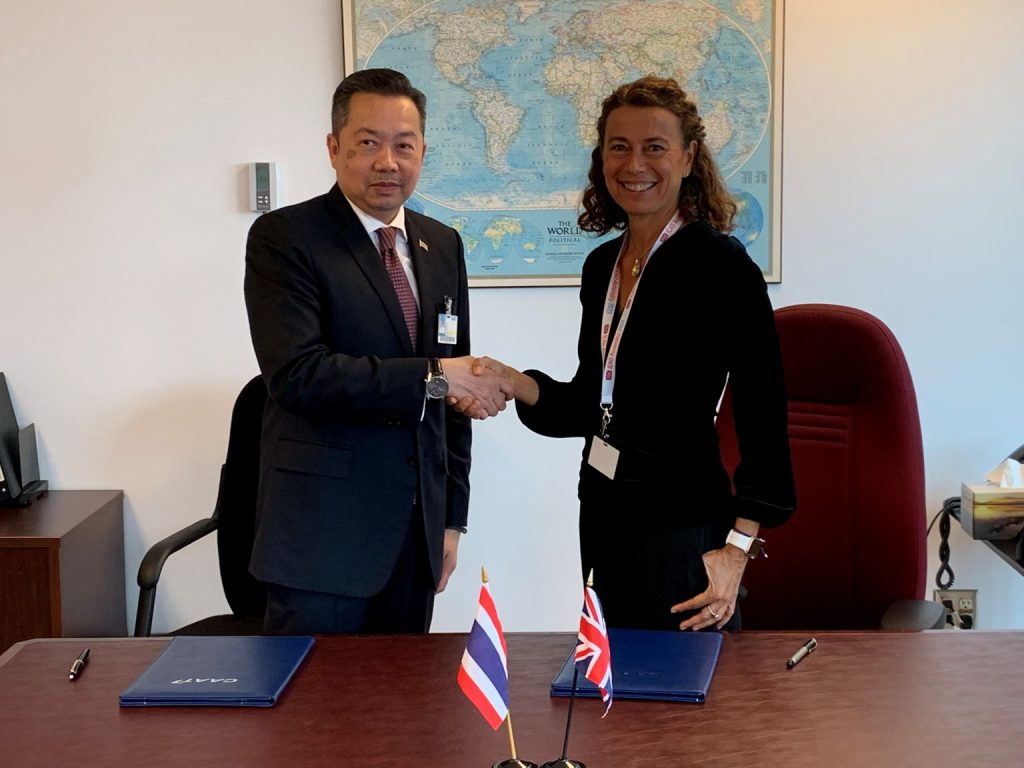
โครงการให้คำปรึกษาและฝึกอบรมเพื่อสนับสนุนการใช้บังคับกฎระเบียบด้านการบินพลเรือนของประเทศไทย (TCARs) โดยมีการลงนามสัญญาในวันแรกของการประชุมสมัชชาสมัยสามัญองค์การการบินพลเรือนระหว่างประเทศ ครั้งที่ 41 ณ สำนักงานใหญ่ ICAO เมืองมอนทรีออล ประเทศแคนาดา
ในระยะเวลา 5 ปีนับจากนี้ CAAi และ CAAT จะร่วมมือกันในกา
ในระยะเวลา 5 ปีนับจากนี้ CAAi และ CAAT จะร่วมมือกันในการสนับสนุนเพื่อเตรียมความพร้อมการเปลี่ยนผ่าน เพื่อนำไปสู่การบังคับใช้กฎระเบียบด้ายการบินพลเรือนในรูปแบบ TCARs
ตามมาตรฐานขององค์การการบินพลเรือนระหว่างประเทศ (ICAO) ที่ครอบคลุมด้านความสมควรเดินอากาศ (Airworthiness) การปฏิบัติการบิน (Flight Operations) การออกใบอนุญาตผู้ประจำหน้าที่ (Personnel Licensing) สนามบิน (Aerodromes) การบริการการเดินอากาศ (Air Navigation Services) และ โดรน (Drones)
Maria Rueda กรรมการผู้จัดการของ CAAi ได้กล่าวภายหลังการลงนามสัญญาว่า
“CAAi รู้สึกยินดีอย่างยิ่งที่ได้ร่วมงานกับ CAAT อีกครั้ง ภายหลังจากการร่วมกันร่างและพัฒนากฎระเบียบด้านการบินขึ้นมาใหม่ในรูปแบบ TCARs เช่นเดียวกันในครั้งนี้ที่ได้รับเกียรติจาก CAAT ให้ช่วยดำเนินการต่อเพื่อร่วมกันยกระดับมาตรฐานความปลอดภัยด้านการบินของประเทศไทย”
ในช่วงแรกของการดำเนินงาน CAAi จะให้คำปรึกษา CAAT ให้มีความพร้อมกับการเปลี่ยนแปลงสู่กรอบการกำกับดูแลรูปแบบใหม่ โดย CAAi จะดำเนินงานร่วมกับ CAAT ในการวิเคราะห์การเปลี่ยนแปลงที่อาจเกิดขึ้นในอนาคตพร้อมทั้งกำหนดแผนของการเปลี่ยนแปลงดังกล่าว และ CAAi จะจัดให้มีการฝึกอบรมสำหรับผู้ตรวจสอบด้านการบินเพื่อส่งเสริมความเข้าใจเกี่ยวกับขั้นตอนการปฏิบัติงานให้สอดคล้องกับกฏระเบียบใหม่ นอกจากนี้ จะคอยให้คำแนะนำกับผู้ที่มีส่วนได้ส่วนเสียและช่วยเหลือ CAAT ในการจัดการประชุมเชิงปฏิบัติการสำหรับภาคอุตสาหกรรมเพื่ออธิบายถึงการเปลี่ยนแปลงที่อาจส่งผลกระทบต่อหน่วยงานที่เกี่ยวข้อง
ในระยะที่ 2 นี้ จะครอบคลุมถึงการเปลี่ยนแปลงของกฎระเบียบด้านการบินรูปแบบใหม่ โดย CAAi จะจัดให้มีการฝึกปฏิบัติงานจริง (on-the-job training) เกี่ยวกับกระบวนการและขั้นตอนใหม่ โดยจะทำงานร่วมกับผู้ตรวจสอบด้านการบินของ CAAT
CAAT จะเป็นผู้ดำเนินการเปลี่ยนแปลงการอนุมัติใบอนุญาตต่าง ๆ ให้เป็นไปตามกฎ ข้อบังคับและมาตรฐานใหม่ที่และกำกับดูแลให้มั่นใจว่าการดำเนินการของระบบใหม่ สอดคล้องกับมาตรฐานสากลและแนวปฏิบัติที่ถูกกำหนดขึ้นโดย ICAO
นาย สุทธิพงษ์ คงพูล ผอ. CAAT ได้แสดงความเห็นว่า
CAAT รู้สึกยินดีเป็นอย่างยิ่งที่ CAAi เข้ามาเป็นที่ปรึกษาของโครงการนี้ ด้วย CAAT มีอำนาจหน้าที่ในการกำกับดูแล ควบคุม ส่งเสริม และพัฒนากิจการการบินพลเรือนในด้านต่าง ๆ ให้เป็นไปตามกฎหมายและมาตรฐานสากล โดยนอกจาก CAAT จะได้ออกกฎระเบียบที่ใช้สำหรับกำกับดูแลกิจการการบินพลเรือนของประเทศไทยแล้ว CAAT ได้ว่าจ้าง CAAi เป็นที่ปรึกษาเพื่อสนับสนุนให้ประเทศไทยสามารถปฏิบัติตามพันธกรณีของอนุสัญญาว่าด้วยการบินพลเรือนระหว่างประเทศได้อย่างเป็นระบบ โดยจัดทำ TCARs ซึ่งเป็นกฎหมายลำดับรองด้านความปลอดภัยการบินพลเรือนระบบใหม่ที่มีความสอดคล้องกับมาตรฐานสากล
CAAT จะพัฒนา TCARs เป็นกฎหมายลำดับรองด้านการบินของประเทศไทย อย่างไรก็ตาม การพัฒนากฎหมายลำดับรองในรูปแบบและโครงสร้างของ TCARs นั้นเป็นรูปแบบใหม่สำหรับประเทศไทย จึงจำเป็นที่จะต้องเตรียมความพร้อมให้กับบุคลากรของ กพท. และสร้างความรู้และความเข้าใจให้แก่ผู้เกี่ยวข้องในภาคอุตสาหกรรมการบินของประเทศที่ต้องอยู่ภายใต้บังคับของกฎระเบียบดังกล่าว
การจัดทำแผนการเปลี่ยนผ่านการใช้บังคับกฎหมายในรูปแบบ TCARs จึงต้องมีความครอบคลุมและครบถ้วนในทุกด้านเนื่องจากเรื่องนี้เป็นการเปลี่ยนระบบกฎหมายของไทยเพื่อให้เกิดผลสัมฤทธิ์ตามเป้าหมายในการที่ประเทศไทยจะมีระบบกฎระเบียบด้านการบินที่เป็นมาตรฐานสากล เข้าใจง่าย และสามารถบังคับใช้ได้อย่างมีประสิทธิภาพ การดำเนินการจึงจำเป็นต้องดำเนินการด้วย ความถูกต้อง รอบคอบ และเป็นระบบ เพื่อไม่ให้เกิดช่องว่างในการบังคับใช้กฎหมายในแต่ละเรื่องอันจะส่งผลกระทบต่อผู้ประกอบการในอุตสาหกรรมการบินได้
CAAT มั่นใจว่า CAAi มีผู้เชี่ยวชาญที่มากด้วยประสบการณ์ สามารถสนับสนุนการพัฒนาแผนและการดำเนินการของแต่ละขั้นตอนในช่วงการเปลี่ยนผ่านจากระบบปัจจุบันไปสู่ระบบใหม่ได้
ดังนั้น ในแต่ละขั้นตอนและรายละเอียดของแผนการเปลี่ยนผ่านการใช้บังคับกฎหมาย TCARs จะต้องมีความถูกต้องและเป็นระบบมาตรฐานสากลเพื่อให้เกิดผลสำเร็จและไม่กระทบต่อภาคอุตสาหกรรม นอกจากนี้ ยังเป็นการช่วยเตรียมบุคลากรของ CAAT และผู้ที่มีส่วนได้ส่วนเสียในอุตสาหกรรมให้มีความพร้อมต่อการปฏิบัติหน้าที่ให้ได้มาตรฐานและบรรลุประสิทธิภาพสูงสุดสำหรับประเทศ
โครงการนี้เกิดขึ้นได้จากความร่วมมืออันดีระหว่าง CAAT และ CAAi ในช่วงไม่กี่ปีที่ผ่านมา ในปี 2560 CAAi ได้ให้ความช่วยเหลือ CAAT ในกระบวนการรับรองผู้ดำเนินการเดินอากาศใหม่สำหรับสายการบินไทยที่ทำการบินระหว่างประเทศ ซึ่งนำไปสู่การยกเลิกข้อบกพร่องที่มีนัยสำคัญต่อความปลอดภัยของ ICAO และผลการตรวจสอบ ICVM ในเชิงบวกจาก ICAO นอกจากนั้นแล้ว CAAi ยังได้ให้การสนับสนุน CAAT ในการร่างกฎระเบียบระบบใหม่ รวมถึงจัดทำกระบวนการดำเนินงาน (Procedures) คู่มือ (Manuals) แบบฟอร์ม (Forms) และรายการตรวจสอบ (Checklists) ที่สอดคล้องกับ TCARs
Matthew Margesson หัวหน้าฝ่ายปฏิบัติการระหว่างประเทศของ CAAi กล่าวว่า
โครงการนี้นับเป็นก้าวสำคัญของ CAAT ด้วยกฎระเบียบที่ทันสมัยและสอดคล้องกับมาตรฐานของ ICAO ประเทศไทยจะสร้างรากฐานการกำกับดูแลที่แข็งแกร่งและมุ่งเน้นการขยายภาคการขนส่งทางอากาศของไทยอย่างปลอดภัยในอนาคต และ CAAi เองก็ตั้งตารอคอยการร่วมงานกับ CAAT เป็นอย่างยิ่ง
โครงการนี้จะเริ่ม ในเดือนตุลาคม 2565 และคาดว่าจะแล้วเสร็จในปี 2570
The Civil Aviation Authority of Thailand (CAAT) has appointed CAA International (CAAi) for technical assistance to implement new civil regulations into Thailand’s aviation system. The contract was signed on the first day of the ICAO 41st Assembly in Montreal.
Over the next five years, UK Civil Aviation Authority experts will work with their Thai counterparts to support the preparation, transition, and compliance of new ICAO-compliant standards. The new regulations will cover multiple domains, including Airworthiness, Flight Operations, Personnel Licensing, Aerodromes, Air Navigation Services, and Drones.
Speaking after the contract signing, Maria Rueda, Managing Director at CAAi, said:
“We are delighted to work with our regulatory counterparts at CAA Thailand once again. Having helped draft and develop a suite of new aviation regulations, we are honoured to have been asked to assist in their implementation and jointly continue the journey to enhance aviation safety standards in Thailand.”
During the project’s first phase, CAAi will help the Thai regulator prepare for the transition to the new regulatory framework. CAAi will work with CAAT to analyse the changes ahead and help establish transition plans. CAAi will also provide training for inspectorate staff to promote a common understanding of the new regulatory procedures.
In addition, CAAi will advise on stakeholder engagement and assist CAAT with industry workshops that explain how the changes affect regulated entities.
Phase 2 will cover the transition of the new aviation regulations. CAAi will provide CAAT with practical on-the-job training to embed the new processes and procedures, working alongside Thai inspectors.
CAAT will lead the transition of approvals and licenses to the new regulatory standards and ensure all oversight functions are conducted under the new regulatory system in compliance with the international standards and recommended practices set out by ICAO.
Suttipong Kongpool, Director-General from CAA Thailand, commented
CAAT is delighted to have CAAi as a consultant for this project. As CAAT has powers and responsibilities for regulating, controlling, promoting, and developing civil aviation in many aspects to be in line with laws and universal standards, CAAT has promulgated rules and regulations for regulating Thailand’s civil aviation. CAAT hired CAAi as a consultant to support Thailand in systematically following obligations under the Convention on International Civil Aviation by; developing Thailand Civil Aviation Regulations (TCARs) as a new scheme of secondary legislation on civil aviation safety, which is consistent with universal standards.
CAAT will then develop TCARs to be Thailand’s civil aviation rules and regulations. However, developing secondary legislation in the form and structure of TCARs is nouveau regime for Thailand and needs to prepare CAAT’s personnel, as well as create understanding and knowledge of stakeholders in the aviation industry to be governed by such rules and regulations in the future.
A comprehensive transition plan for implementing TCARs must be established to cover all areas of TCARs, as this will change Thailand’s civil aviation secondary legislation regime. To reach such goal, the plan and its implementation must be accurate, discreet, and systematic to avoid a gap in implementation and enforcement in each area, which may affect operators and stakeholders in the industry.
CAAT is confident that CAAi, with its experts equipped with experience, will be able to support the plan development and implementation in each step during a transition period from the current system to the new system so that each step and detail of the transition plan and implementation will be correct and systematic in line with international standards, which may not be that complete and may affect Thailand’s aviation industry. Also, this will help prepare CAAT’s personnel and industry stakeholders to be ready for performing their duties to reach standards and achieve utmost efficiency for the country.”
This project builds upon successful collaboration between CAAT and CAAi in recent years. In 2017, CAAi assisted CAAT with the recertification of Thai-registered international airlines, leading to the removal of an ICAO Significant Safety Concern and a positive ICVM audit result by ICAO. More recently, CAAi supported CAAT in drafting new Thai regulations, manuals, forms, procedures, and checklists to underpin the new standards.
Matthew Margesson, Head of International Operations at CAAi, added:
“This project marks an important milestone for civil aviation in Thailand. With modernised, ICAO-compliant regulations, Thailand will build a solid, future-focused regulatory foundation to grow the Thai air transport sector safely and responsibly. We look forward to working with CAAT.”
The project will commence in October 2022 and is expected to complete in 2027.
ที่มา CAAi to support Thailand’s new civil aviation regulations | News (caainternational.com)
Credit ข่า : สำนักงานการบินพลเรือนแห่ง ประเทศไทย : https://www.caat.or.th/